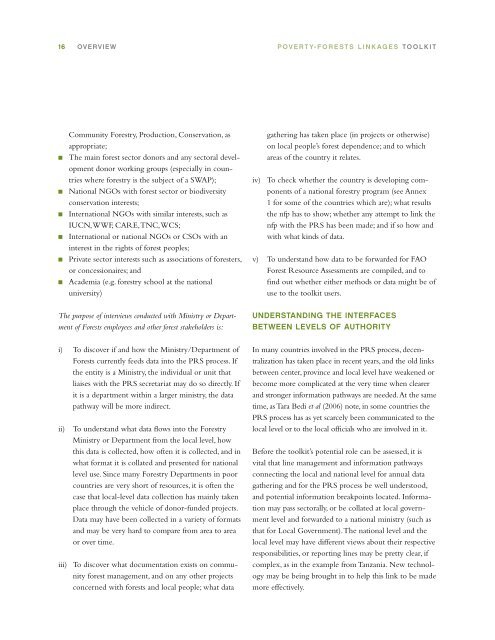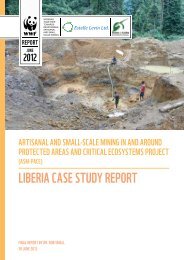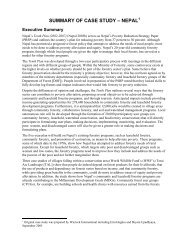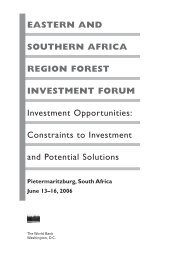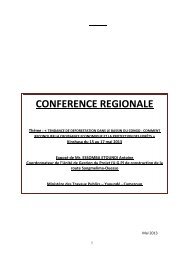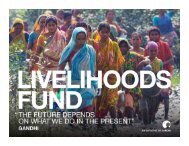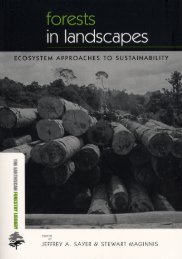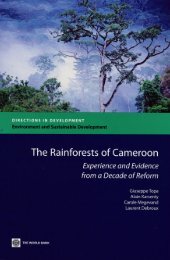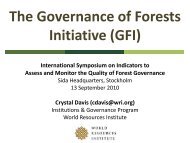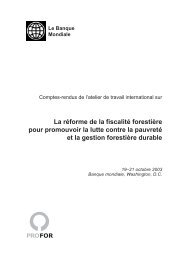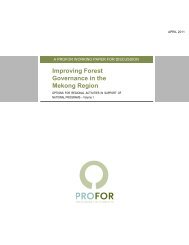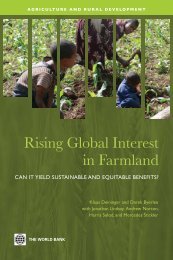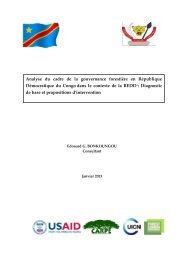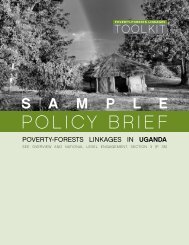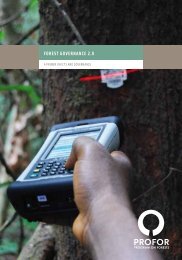Poverty-Forests Linkages Toolkit - IUCN
Poverty-Forests Linkages Toolkit - IUCN
Poverty-Forests Linkages Toolkit - IUCN
You also want an ePaper? Increase the reach of your titles
YUMPU automatically turns print PDFs into web optimized ePapers that Google loves.
16 OVERVIEW<br />
POVERTY-FORESTS LINKAGES TOOLKIT<br />
n<br />
n<br />
n<br />
n<br />
n<br />
n<br />
Community Forestry, Production, Conservation, as<br />
appropriate;<br />
The main forest sector donors and any sectoral development<br />
donor working groups (especially in countries<br />
where forestry is the subject of a SWAP);<br />
National NGOs with forest sector or biodiversity<br />
conservation interests;<br />
International NGOs with similar interests, such as<br />
<strong>IUCN</strong>, WWF, CARE, TNC, WCS;<br />
International or national NGOs or CSOs with an<br />
interest in the rights of forest peoples;<br />
Private sector interests such as associations of foresters,<br />
or concessionaires; and<br />
Academia (e.g. forestry school at the national<br />
university)<br />
gathering has taken place (in projects or otherwise)<br />
on local people’s forest dependence; and to which<br />
areas of the country it relates.<br />
iv) To check whether the country is developing components<br />
of a national forestry program (see Annex<br />
1 for some of the countries which are); what results<br />
the nfp has to show; whether any attempt to link the<br />
nfp with the PRS has been made; and if so how and<br />
with what kinds of data.<br />
v) To understand how data to be forwarded for FAO<br />
Forest Resource Assessments are compiled, and to<br />
find out whether either methods or data might be of<br />
use to the toolkit users.<br />
The purpose of interviews conducted with Ministry or Department<br />
of <strong>Forests</strong> employees and other forest stakeholders is:<br />
i) To discover if and how the Ministry/Department of<br />
<strong>Forests</strong> currently feeds data into the PRS process. If<br />
the entity is a Ministry, the individual or unit that<br />
liaises with the PRS secretariat may do so directly. If<br />
it is a department within a larger ministry, the data<br />
pathway will be more indirect.<br />
ii) To understand what data flows into the Forestry<br />
Ministry or Department from the local level, how<br />
this data is collected, how often it is collected, and in<br />
what format it is collated and presented for national<br />
level use. Since many Forestry Departments in poor<br />
countries are very short of resources, it is often the<br />
case that local-level data collection has mainly taken<br />
place through the vehicle of donor-funded projects.<br />
Data may have been collected in a variety of formats<br />
and may be very hard to compare from area to area<br />
or over time.<br />
iii) To discover what documentation exists on community<br />
forest management, and on any other projects<br />
concerned with forests and local people; what data<br />
Understanding the interfaces<br />
between levels of authority<br />
In many countries involved in the PRS process, decentralization<br />
has taken place in recent years, and the old links<br />
between center, province and local level have weakened or<br />
become more complicated at the very time when clearer<br />
and stronger information pathways are needed. At the same<br />
time, as Tara Bedi et al (2006) note, in some countries the<br />
PRS process has as yet scarcely been communicated to the<br />
local level or to the local officials who are involved in it.<br />
Before the toolkit’s potential role can be assessed, it is<br />
vital that line management and information pathways<br />
connecting the local and national level for annual data<br />
gathering and for the PRS process be well understood,<br />
and potential information breakpoints located. Information<br />
may pass sectorally, or be collated at local government<br />
level and forwarded to a national ministry (such as<br />
that for Local Government). The national level and the<br />
local level may have different views about their respective<br />
responsibilities, or reporting lines may be pretty clear, if<br />
complex, as in the example from Tanzania. New technology<br />
may be being brought in to help this link to be made<br />
more effectively.


